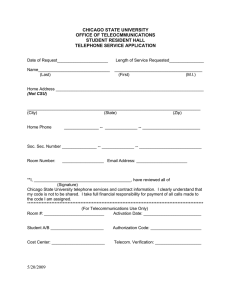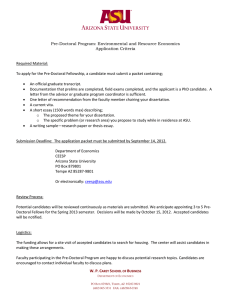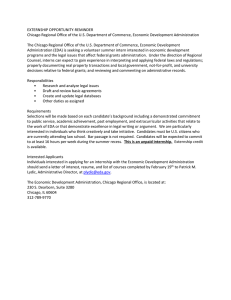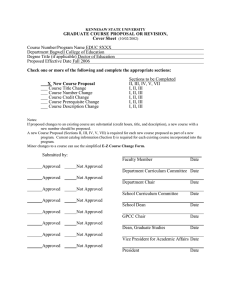GRADUATE COURSE PROPOSAL OR REVISION, Cover Sheet Course Number/Program Name EDAD 8100
advertisement
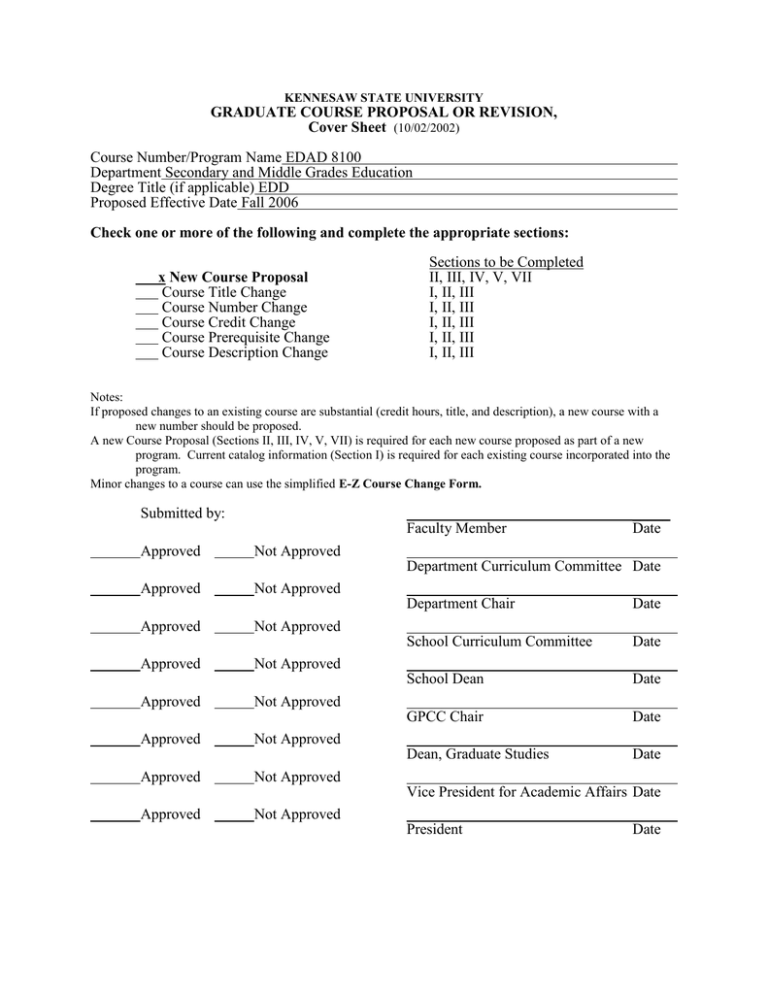
KENNESAW STATE UNIVERSITY GRADUATE COURSE PROPOSAL OR REVISION, Cover Sheet (10/02/2002) Course Number/Program Name EDAD 8100 Department Secondary and Middle Grades Education Degree Title (if applicable) EDD Proposed Effective Date Fall 2006 Check one or more of the following and complete the appropriate sections: x New Course Proposal Course Title Change Course Number Change Course Credit Change Course Prerequisite Change Course Description Change Sections to be Completed II, III, IV, V, VII I, II, III I, II, III I, II, III I, II, III I, II, III Notes: If proposed changes to an existing course are substantial (credit hours, title, and description), a new course with a new number should be proposed. A new Course Proposal (Sections II, III, IV, V, VII) is required for each new course proposed as part of a new program. Current catalog information (Section I) is required for each existing course incorporated into the program. Minor changes to a course can use the simplified E-Z Course Change Form. Submitted by: Faculty Member Approved _____ Date Not Approved Department Curriculum Committee Date Approved Approved Approved Approved Approved Approved Not Approved Department Chair Date School Curriculum Committee Date School Dean Date GPCC Chair Date Dean, Graduate Studies Date Not Approved Not Approved Not Approved Not Approved Not Approved Vice President for Academic Affairs Date Approved Not Approved President Date KENNESAW STATE UNIVERSITY GRADUATE COURSE/CONCENTRATION/PROGRAM CHANGE I. Current Information (Fill in for changes) Page Number in Current Catalog Course Prefix and Number Course Title Credit Hours Prerequisites Description (or Current Degree Requirements) II. Proposed Information (Fill in for changes and new courses) Course Prefix and Number _______EDAD 8100_________________________ Course Title __Curriculum Theory and Development ________ Credit Hours 3-0-3 Prerequisites Admission to EdS/EdD program Description (or Proposed Degree Requirements) This course is designed for students of curriculum theory, development, and design/planning. It provides an in-depth study of the foundations, principles, and issues of curriculum as they affect teachers, supervisors, and administrators who participate in curriculum making. The course consists of two major components: curriculum theory, which is an interdisciplinary study of philosophical, historical, psychological, social, and cultural foundations of curriculum; and curriculum development, which examines various models of curriculum as processes that have emerged and continue to shape education and schooling. III. Justification Curriculum as a field of study is both complex and diverse with multiple perspectives and approaches. Leaders for learning in P12 schools must be prepared to serve in distributed leadership roles, some of which require expertise in curriculum and instruction. This course will approach curriculum study by looking at curriculum not as a technical document, but as a social process. The course will introduce various theoretical and development discourses in the field of curriculum and the representative works of several influential theorists and individuals instrumental in the development of curriculum models. It is an introduction, by no means complete. The study of curriculum continually undergoes change; students are expected to acquire a working knowledge of contemporary curriculum thought, its historical antecedents, and be able to articulate a position, however temporary, where they find themselves within the field. The curriculum theory component of the course explores theory as a field of scholarly inquiry that endeavors to understand curriculum across the academic disciplines. Students will focus especially upon interdisciplinary themes, as well as the relations among curriculum, the individual, and society, in order to understand the overall educational significance of the curriculum. The scope of curriculum development will include traditional and common approaches to the field, i.e., the study of how curriculum is planned, implemented, and evaluated, along with the people, processes, and procedures involved in its construction. IV. Additional Information (for New Courses only) Instructor: Dr. Ugena Whitlock Texts: Select from the following: 1. Daniels, H. & Bizar, M. (1998) Methods That Matter: Six Structures for Best Practice Classrooms. York, ME: Stenhouse Publishers. 2. Pinar, W., Reynolds, W., Slattery, P., and Taubman, P. (1996). Understanding Curriculum. New York: Peter Lang. 3. Slattery, P. (1995). Curriculum Development in the Postmodern Era. New York: Garland Publishing. 4. Dewey, J., School & Society/The Child and the Curriculum. Chicago: University of Chicago Press. 5. Tyler, R.W., Basic Principles of Curriculum. Chicago: University of Chicago Press. 6. Apple, M., Ideology & Curriculum. New York: Routledge. Prerequisites: Admission to specialist or doctoral program. Objectives: VII. Course Objectives: The objectives of this course are consistent with the Bagwell College of Education KSDs for Doctoral Candidates. Students will be able to: Course objective Doctoral Distributed PSC/NCATE KSDs Leadership Roles Standard Analyze and evaluate issues, historical perspectives and 1A, 1B, Curriculum, 1.4, 1.5 current political and cultural influences in curriculum 1C, 2A Instruction & theory and development Assessment Leader Analyze and evaluate functions, purposes, history and organization of schools and schooling, as well as issues associated with the process of school reform and current affairs in education 1B, 2A, 4D, 4E, 5A, 6B Curriculum, Instruction & Assessment Leader 1.4, 1.5, 1.7, 1.8 Identify classroom or school-wide practices/products/processes in need of differentiation and suggest effective, appropriate means of meeting the needs of all students based on effective elements of curriculum development and design Synthesize and evaluate current research on a specific educational issue related to curriculum theory and development as they inform teaching and learning. 6B, 6C, 6D Curriculum, Instruction & Assessment Leader 1.4, 1.5, 1.6, 1.7, 1.8 1A, 1B, 1C Curriculum, Instruction & Assessment Leader 1.4, 1.5, 1.6, 1.7, 1.8 Examine social, political, cultural, and psychological factors of curriculum theory and development and their implications for influencing teaching and learning 1, 2B, 2D, 2E, 3A, 3B, 3C, 5 Curriculum, Instruction & Assessment Leader 1.4, 1.5, 1.6, 1.7, 1.8 Analyze one’s impact on student learning in diverse classrooms and schools and make suggestions for 3, 4A, 4B, 4D, 4E, Curriculum, Instruction & 1.4, 1.5, 1.6, 1.7, 1.8 enhancement and/or improvement. 4F, 5C, 5E, 6 Assessment Leader Understand the impact of classroom and school climate on learning and work with colleagues to positively impact that environment 22, 2B, 2C, 2D, 2E, 3A, 3B, 3C, 4E, 5B, 5C, 6A, 6D 4A, 4C, 4D, 4E, 4F Curriculum, Instruction & Assessment Leader 1.4, 1.5, 1.6, 1.7, 1.8 Curriculum, Instruction & Assessment Leader 1.4, 1.5, 1.6, 1.7, 1.8 Document one’s involvement in school, district and community activities beyond one’s own classroom which are designed to positively impact student learning and identify areas for additional involvement. 1C, 2B, 2C, 2D, 2E, 4A Curriculum, Instruction & Assessment Leader 1.4, 1.5, 1.6, 1.7, 1.8 Collaborate with peers and colleagues in evaluating teaching practices and leadership activities in schools. 1A, 1B, 1C, 2A, 2C, 2D, 2E, 4A Curriculum, Instruction & Assessment Leader 1.4, 1.5, 1.6, 1.7, 1.8 Conduct an analysis of current teaching practices in schools and using research based best practice, either justify maintaining current practice OR propose changes which are consistent with research based best practices. 1A, 1B, 1C, 4A, 4C, 4D Curriculum, Instruction & Assessment Leader 1.4, 1.5, 1.6, 1.7, 1.8 Plan, implement and evaluate instruction which incorporates a variety of learning theories and assessment techniques Instructional Method Case-based problem solving, seminar, small group/whole class discussion, Socratic dialogue, lecture Method of Evaluation 1. Research Paper: This paper is designed so that students can focus on a particular strand, aspect, or issue of curriculum theory and/or development. This might entail critiquing a book from a theoretical perspective, developing specifically the implications of the book for classroom practice or situating the book within a particular current contemporary educational reform, movement or problem. In other words, this assignment should allow the doctoral student to focus in depth on a particular issue; the student is expected to research other works to help develop ideas. Further guidelines will be discussed. 2. Reflective Writing on Reading Assignments: Students will periodically be assigned reflective papers on assigned readings in which they will review/reflect upon salient points of the work and the particular curricular perspective which it embodies. Each paper will be two double-spaced pages, regular font size. It is designed to help the student develop his or her writing to be concise and lucid. 3. Exams: Exams will be used to further assess comprehension of curriculum theory and development discussed in class and in the assigned reading. 4. Field Experience: Students of curriculum theory should be able to take their knowledge of curriculum theory and apply it to practical situations. Thus, EDUC 8xxx students will be expected to investigate the curriculum at a school of their choice. They will interview teachers, curriculum specialists, and/or administrators to learn more about the development of the school’s curriculum; identifying the social constructs, either explicit or implied. They will then align the curriculum to theory and to the Georgia Performance Standards, making suggestions as necessary to provide a standards-based curriculum that is also theoretically grounded. 5. Small Group Participation: Students are required to participate in two small group presentations. These presentations will focus on presenting a contemporary curricular discourse. The presentation should focus on how this particular perspective of curriculum makes sense of the world. What are the major ideas, what major thinkers or works does this perspective draw on, who are its major proponents and how have they helped us to see the world differently. These presentations are expected to be creative, interactive and engaging. Handouts with major ideas, bibliographies, biographies, etc. are most welcome. 6. Attendance and Participation: Students are expected to take an active role in generating class discussions. To this end, students are expected to come to class having read the course material thoroughly. What this means is that students should be able to distinguish among the major themes or issues raised in each reading; identify concepts and vocabulary that are unfamiliar or confusing; articulate the significant contributions and/or shortcomings of the particular readings. If you cannot attend class, please contact the professor prior to class. V. Resources and Funding Required (New Courses only) Course funding addressed in budget of umbrella EdD degree proposal as drafted by the Dean and Associate Dean of Graduate Studies for the Bagwell College of Education Resource Amount Faculty Other Personnel Equipment Supplies Travel New Books New Journals Other (Specify) TOTAL Funding Required Beyond Normal Departmental Growth VI. COURSE MASTER FORM This form will be completed by the requesting department and will be sent to the Office of the Registrar once the course has been approved by the Office of the President. The form is required for all new courses. DISCIPLINE COURSE NUMBER COURSE TITLE FOR LABEL (Note: Limit 16 spaces) CLASS-LAB-CREDIT HOURS Approval, Effective Term Grades Allowed (Regular or S/U) If course used to satisfy CPC, what areas? Learning Support Programs courses which are required as prerequisites Adolescent Education EDAD 8100 Curriculum 3-0-3 Fall 2006 Regular APPROVED: ________________________________________________ Vice President for Academic Affairs or Designee __ VII Attach Syllabus I. Course Number: EDUC 8XXX Course Title: Curriculum Theory and Development College: Bagwell College of Education Semester: Room: II. Instructor & Contact Info: III. IV. Class Meeting Time: Texts: Required: 1. Pinar, W., Reynolds, W., Slattery, P., and Taubman, P. (1996). Understanding Curriculum. New York: Peter Lang. 2. Slattery, P. (1995). Curriculum Development in the Postmodern Era. New York: Garland Publishing. 3. Dewey, J., School & Society/The Child and the Curriculum. Chicago: University of Chicago Press. 4. Tyler, R.W., Basic Principles of Curriculum. Chicago: University of Chicago Press. 5. Apple, M., Ideology & Curriculum. New York: Routledge. V. VI. Catalog Course Description: EDUC 8XXX. 3-0-3. Prerequisite: Admission to Doctoral Program. This course is designed for students of curriculum theory, development, and design/planning. It provides an in-depth study of the foundations, principles, and issues of curriculum as they affect teachers, supervisors, and administrators who participate in curriculum making. The course consists of two major components: curriculum theory, which is an interdisciplinary study of philosophical, historical, psychological, social, and cultural foundations of curriculum; and curriculum development, which examines various models of curriculum as processes that have emerged and continue to shape education and schooling. Purpose and Rationale: KENNESAW STATE UNIVERSITY’S CONCEPTUAL FRAMEWORK: Collaborative development of expertise in teaching and learning The Professional Teacher Education Unit (PTEU) at Kennesaw State University is committed to developing expertise among candidates in initial and advanced programs as teachers and leaders who possess the capability, intent and expertise to facilitate high levels of learning in all of their students through effective, research-based practices in classroom instruction, and who enhance the structures that support all learning. To that end, the PTEU fosters the development of candidates as they progress through stages of growth from novice to proficient to expert and leader. Within the PTEU conceptual framework, expertise is viewed as a process of continued development, not an end-state. To be effective, teachers and educational leaders must embrace the notion that teaching and learning are entwined and that only through the implementation of validated practices can all students construct meaning and reach high levels of learning. In that way, candidates at the doctoral level leaders for learning and facilitators of the teaching and learning process. Finally, the PTEU recognizes, values and demonstrates collaborative practices across the college and university and extends collaboration to the community-at-large. Through this collaboration with professionals in the university, the public and private schools, parents and other professional partners, the PTEU meets the ultimate goal of assisting Georgia schools in bringing all students to high levels of learning. Knowledge Base Teacher development is generally recognized as a continuum that includes four phases: preservice, induction, inservice, renewal (Odell, Huling, and Sweeny, 2000). Just as Sternberg (1996) believes that the concept of expertise is central to analyzing the teaching-learning process, the teacher education faculty at KSU believe that the concept of expertise is central to preparing effective classroom teachers and teacher leaders. Researchers describe how during the continuum phases teachers progress from being Novices learning to survive in classrooms toward becoming Experts who have achieved elegance in their teaching. We, like Sternberg (1998), believe that expertise is not an end-state but a process of continued development. Use of Technology : Technology Standards for Educators are required by the Professional Standards Commission. Telecommunication and information technologies will be integrated throughout the master teacher preparation program, and all candidates must be able to use technology to improve student learning and meet Georgia Technology Standards for Educators. During the courses, candidates will be provided with opportunities to explore and use instructional media. They will master use of productivity tools, such as multimedia facilities, local-net and Internet, and feel confident to design multimedia instructional materials, and create WWW resources. Rationale for Course Curriculum as a field of study is both complex and diverse with multiple perspectives and approaches. This course will approach curriculum study by looking at curriculum not as a technical document, but as a social process. The course will introduce various theoretical and development discourses in the field of curriculum and the representative works of several influential theorists and individuals instrumental in the development of curriculum models. It is an introduction, by no means complete. The study of curriculum continually undergoes change; students are expected to acquire a working knowledge of contemporary curriculum thought, its historical antecedents, and be able to articulate a position, however temporary, where they find themselves within the field. The curriculum theory component of the course explores theory as a field of scholarly inquiry that endeavors to understand curriculum across the academic disciplines. Students will focus especially upon interdisciplinary themes, as well as the relations among curriculum, the individual, and society, in order to understand the overall educational significance of the curriculum. The scope of curriculum development will include traditional and common approaches to the field, i.e., the study of how curriculum is planned, implemented, and evaluated, along with the people, processes, and procedures involved in its construction. VIII. Course Objectives: The objectives of this course are consistent with the Bagwell College of Education KSDs for Doctoral Candidates. Students will be able to: Course objective Doctoral Distributed PSC/NCATE KSDs Leadership Roles Standard Analyze and evaluate issues, historical perspectives and 1A, 1B, Curriculum, 1.4, 1.5 current political and cultural influences in curriculum 1C, 2A Instruction & theory and development Assessment Leader Analyze and evaluate functions, purposes, history and 1B, 2A, Curriculum, 1.4, 1.5, 1.7, organization of schools and schooling, as well as issues associated with the process of school reform and current affairs in education 4D, 4E, 5A, 6B Instruction & Assessment Leader 1.8 Identify classroom or school-wide practices/products/processes in need of differentiation and suggest effective, appropriate means of meeting the needs of all students based on effective elements of curriculum development and design Synthesize and evaluate current research on a specific educational issue related to curriculum theory and development as they inform teaching and learning. 6B, 6C, 6D Curriculum, Instruction & Assessment Leader 1.4, 1.5, 1.6, 1.7, 1.8 1A, 1B, 1C Curriculum, Instruction & Assessment Leader 1.4, 1.5, 1.6, 1.7, 1.8 Examine social, political, cultural, and psychological factors of curriculum theory and development and their implications for influencing teaching and learning 1, 2B, 2D, 2E, 3A, 3B, 3C, 5 Curriculum, Instruction & Assessment Leader 1.4, 1.5, 1.6, 1.7, 1.8 Analyze one’s impact on student learning in diverse classrooms and schools and make suggestions for enhancement and/or improvement. 3, 4A, 4B, 4D, 4E, 4F, 5C, 5E, 6 Curriculum, Instruction & Assessment Leader 1.4, 1.5, 1.6, 1.7, 1.8 Understand the impact of classroom and school climate on learning and work with colleagues to positively impact that environment 22, 2B, 2C, 2D, 2E, 3A, 3B, 3C, 4E, 5B, 5C, 6A, 6D 4A, 4C, 4D, 4E, 4F Curriculum, Instruction & Assessment Leader 1.4, 1.5, 1.6, 1.7, 1.8 Curriculum, Instruction & Assessment Leader 1.4, 1.5, 1.6, 1.7, 1.8 Document one’s involvement in school, district and community activities beyond one’s own classroom which are designed to positively impact student learning and identify areas for additional involvement. 1C, 2B, 2C, 2D, 2E, 4A Curriculum, Instruction & Assessment Leader 1.4, 1.5, 1.6, 1.7, 1.8 Collaborate with peers and colleagues in evaluating teaching practices and leadership activities in schools. 1A, 1B, 1C, 2A, 2C, 2D, 2E, 4A Curriculum, Instruction & Assessment Leader 1.4, 1.5, 1.6, 1.7, 1.8 Conduct an analysis of current teaching practices in schools and using research based best practice, either justify maintaining current practice OR propose changes which are consistent with research based best practices. 1A, 1B, 1C, 4A, 4C, 4D Curriculum, Instruction & Assessment Leader 1.4, 1.5, 1.6, 1.7, 1.8 Plan, implement and evaluate instruction which incorporates a variety of learning theories and assessment techniques Course Requirements and Assignments 1. Research Paper: This paper is designed so that students can focus on a particular strand, aspect, or issue of curriculum theory and/or development. This might entail critiquing a book from a theoretical perspective, developing specifically the implications of the book for classroom practice or situating the book within a particular current contemporary educational reform, movement or problem. In other words, this assignment should allow the doctoral student to focus in depth on a particular issue; the student is expected to research other works to help develop ideas. Further guidelines will be discussed. 2. Reflective Writing on Reading Assignments: Students will periodically be assigned reflective papers on assigned readings in which they will review/reflect upon salient points of the work and the particular curricular perspective which it embodies. Each paper will be two double-spaced pages, regular font size. It is designed to help the student develop his or her writing to be concise and lucid. 3. Exams: Exams will be used to further assess comprehension of curriculum theory and development discussed in class and in the assigned reading. 4. Field Experience: Students of curriculum theory should be able to take their knowledge of curriculum theory and apply it to practical situations. Thus, EDUC 8xxx students will be expected to investigate the curriculum at a school of their choice. They will interview teachers, curriculum specialists, and/or administrators to learn more about the development of the school’s curriculum; identifying the social constructs, either explicit or implied. They will then align the curriculum to theory and to the Georgia Performance Standards, making suggestions as necessary to provide a standards-based curriculum that is also theoretically grounded. 5. Small Group Participation: Students are required to participate in two small group presentations. These presentations will focus on presenting a contemporary curricular discourse. The presentation should focus on how this particular perspective of curriculum makes sense of the world. What are the major ideas, what major thinkers or works does this perspective draw on, who are its major proponents and how have they helped us to see the world differently. These presentations are expected to be creative, interactive and engaging. Handouts with major ideas, bibliographies, biographies, etc. are most welcome. 6. Attendance and Participation: Students are expected to take an active role in generating class discussions. To this end, students are expected to come to class having read the course material thoroughly. What this means is that students should be able to distinguish among the major themes or issues raised in each reading; identify concepts and vocabulary that are unfamiliar or confusing; articulate the significant contributions and/or shortcomings of the particular readings. If you cannot attend class, please contact the professor prior to class. Assignments are due on date assigned. All written assignments must be typed in 12 point font with standard margins. Work that is unedited or presented with little thought or planning will not be accepted. IX. Policies Diversity: A variety of materials and instructional strategies will be employed to meet the needs of the different learning styles of diverse learners in class. Candidates will gain knowledge as well as an understanding of differentiated strategies and curricula for providing effective instruction and assessment within multicultural classrooms. One element of course work is raising candidate awareness of critical multicultural issues. A second element is to cause candidates to explore how multiple attributes of multicultural populations influence decisions in employing specific methods and materials for every student. Among these attributes are age, disability, ethnicity, family structure, gender, geographic region, giftedness, language, race, religion, sexual orientation, and socioeconomic status. An emphasis on cognitive style differences provides a background for the consideration of cultural context. (Confessions Assignment) Kennesaw State University provides program accessibility and accommodations for persons defined as disabled under Section 504 of the Rehabilitation Act of 1973 or the Americans with Disabilities Act of 1990. A number of services are available to support students with disabilities within their academic program. In order to make arrangements for special services, students must visit the Office of Disabled Student Support Services (ext. 6443) and develop an individual assistance plan. In some cases, certification of disability is required. Please be aware there are other support/mentor groups on the campus of Kennesaw State University that address each of the multicultural variables outlined above. Professionalism- Academic Honesty: KSU expects that graduate students will pursue their academic programs in an ethical, professional manner. Faculty of the Ed.D. in Adolescent Education program abide by the policies and guidelines established by the university in their expectations for candidates’ work. Candidates are responsible for knowing and adhering to the guidelines of academic honesty as stated in the graduate catalog. Any candidate who is found to have violated these guidelines will be subject to disciplinary action consistent with university policy. For example, plagiarism or other violations of the University’s Academic Honesty policies could result in a grade of “F” in the course and a formal hearing before the Judiciary Committee. Professionalism- Participation, and Attendance: Part of your success in this class is related to your ability to provide peer reviews and feedback to your editing groups regarding their research and their writing. Furthermore, responding effectively and appropriately to feedback from your peers and the professor is another measure of one’s professionalism. In addition, since each class meeting represents a week of instruction/learning, failure to attend class will likely impact your performance on assignments and final exams. Please be prepared with all readings completed prior to class. We depend on one another to ask pertinent and insightful questions. Course Topics Introduction: Re/Conceiving Curriculum—Issues, historical perspectives and current political and cultural influences Introductory activity, classroom discussion Schools & schooling—functions, purposes, history and organization of schools (Dewey) Discussion, group interactive activity The process of school reform; current affairs in education Lab activity, discussion Contextualizing Curriculum: Myths, historical perspective, origins Lecture, discussion Social psychoanalytical perspectives on schooling and education Reading activity, group discussions Technical Rationalism & the Reconceptualization (Tyler & Pinar) Field experience activity due Curriculum as Poststructural Text (Slattery) Explain group presentations Curriculum as Political and Gender & Racial Tex Lecture, discussion Curriculum as Aesthetic, & Theological Text Group Presentations Curriculum as Reproduction & Production (Apple) Lecture, discussion Curriculum as Liberatory Pedagogy (Freire) Discussion Revision lab Research Project Due X. References and additional readings Classics Apple, M., Ideology & Curriculum. New York: Routledge. Ausubel, D. (1968). Educational Psychology: A Cognitive View. NY: Holt, Rinehart and Winston. Bandura, A. (1977). Social Learning Theory. Englewood Cliffs, NJ: Prentice Hall. Bandura, A. (1986). Social Foundations of Thought and Action: A Social Cognitive Theory. Englewood Cliffs, NJ: Prentice-Hall. Bruner, J. (1960). The Process of Education. NY: Random House. Dewey, J. (1916). Democracy and Education. NY: MacMillan. Dewey, J., School & Society/The Child and the Curriculum. Chicago: University of Chicago Press. Gagne, E. (1985). The Cognitive Psychology of School Learning. Boston: Little Brown and Co. Gagne, R. M. (1985). The Conditions of Learning. Fort Worth: Holt, Rinehart, and Winston. Piaget, J. (1952). The Origins of Human Intelligence. NY: International Universities Press. Pinar, W., Reynolds, W., Slattery, P., and Taubman, P. (1996). Understanding Curriculum. New York: Peter Lang. Schunk, D. H. (2004) Learning Theories: An Educational Perspective. Upper Saddle River, NJ: Pearson Prentice Hall. Skinner, B.F. (1954). The science of learning and the art of teaching. Harvard Educational Review, 24, 86-97. Thorndike, R.L. & Hagen, E. (1961). Measurement and Evaluation in Psychology and Education. (2nd ed.). NY: John Wiley and Sons. Tyler, R.W., Basic Principles of Curriculum. Chicago: University of Chicago Press. Others Daniels, H. & Bizar, M. (1998) Methods That Matter: Six Structures for Best Practice Classrooms. York, ME: Stenhouse Publishers. Gardner, H. (1991). The Unschooled Mind. NY: Basic Books. George, P.S., McEwin, C. K., & Jenkins, J. M. (2000) The Exemplary High School. Orlando, FL: Harcourt College Publishers. Grant, C.A. (1994). Best practices in teacher preparation for urban schools: Lessons from the multicultural teacher education literature. Action in Teacher Education, 16(3), 1-18. Herman, J.H., Aschbacher, P.R., & Winters, L. (1992). A Practical Guide to Alternative Assessment. Alexandria, VA: ASCD. Kubiszyn, T., & Borich, G. (1993). Educational Testing and Measurement. (4th ed.)., NY: Harper Collins. Payne, D.A. (1992). Measuring and Evaluating Educational Outcomes. NY: Merrill. Shulman, L. (1999). Taking learning seriously. Change. July/August. 11-17. Slattery, P. (1995). Curriculum Development in the Postmodern Era. New York: Garland Publishing. Stiggins, R.J. & Conklin, N.F. (1992). In Teacher’s Hands: Investigating the Practices of Classroom Assessment. NY: State University of the New York Press. White, R. & Gunstone, M. R. (1992). Probing Understanding. London: Falmer Press. Albany,

